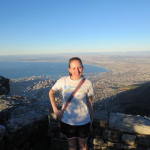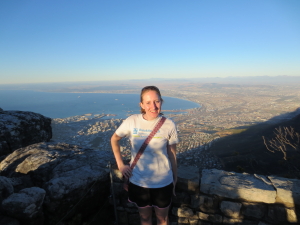| Major(s) | Environmental Analysis-Science major, Religious Studies minor |
| Hobbies | Hiking, backpacking, reading, horseback riding, traveling |
| Hometown | Parker, Colorado |
| Program/Study Site | CIEE: Service Learning - Cape Town, South Africa |

Why study abroad?
For as long as I can remember, I've been really curious about the world around me. I always loved traveling when I was younger, and I welcomed the opportunity to be able to spend a whole semester in a new place, learning about its culture and meeting new people. I truly believe that studying abroad is one of the most incredible opportunities for personal growth, and I couldn't think of a more exciting way to challenge myself.
Why did you choose South Africa?
I knew that I didn't want to have the typical semester-abroad experience in Europe, so I actively searched for programs that were a bit nontraditional. I stumbled upon CIEE's service-learning program, and I immediately knew it was the perfect fit. Cape Town is absolutely gorgeous, and the region is known for its friendly and lively atmosphere. Furthermore, I was excited about the chance to learn about and experience the South Africa's rich history, which still profoundly affects it today. I was truly sold when I learned about the program's service component. I loved the thought of being able to truly get my hands dirty while abroad by working with a local organization.What courses did you enroll in while abroad?
All students on CIEE's service-learning program take the same courses through CIEE (not through UCT, though you often use their facilities). The idea behind this structure is that the courses you take relate directly to your service experience, facilitate reflection of your integration, and enhance your understanding of South Africa's history and its current status. The classes include Poverty and Development, Social Research Methods, Community Partnerships: Theory and Engagement, a Capstone project, and language study. For my language study, I took an introductory Afrikaans class, though you also have the option of taking isiXhosa. For my Capstone project, I developed a Math Resource Center and a peer tutoring program to address dismally low math scores at the school where I did my service (in 2012, just one percent of the school's grade 12 students passed the national math exam at the level required for university admittance). Though completing Capstone was often stressful, it provided a wonderful opportunity to take the lead on a project that had real significance to the community I was working in. It was a lot of fun to get the school's students and even some other service-learners involved. We were even featured on a local South African news show!What was your living situation?
All of the service-learning participants share a house. During my semester abroad, the twenty-seven of us were divided among three houses, all of which were on the same property. Everyone had a single, and we shared a kitchen and living room. Each house had its own RA who acted as a support system and planned a variety of activities around Cape Town. The house itself was located in a beautiful part of Rondebosch just a couple of blocks from UCT and the main road.What did you do for fun?
Sports are really popular in Cape Town. Locals especially love rugby and soccer; games are incredibly lively and definitely a ton of fun. Cape Town also has a lot of options for outdoor activities, and many locals love to get out and enjoy the city's beautiful weather. Table Mountain National Park literally backs up to the UCT campus, so there are seemingly endless options for hiking. The beach is also easily accessible via taxi or train.Highlights of the program:
- SERVICE! I worked at a local high school, and I absolutely loved getting to know my students. They taught me so much about South Africa, and I truly can't imagine my time abroad without them.
- Outdoor Activities – Cape Town's weather is beautiful, and there is no shortage of things to do (hiking, laying on the beach, shark cage diving, etc.).
- The food – Cape Malay cuisine is delicious, and Cape Town has a number of really great restaurants that aren't too expensive.
- Orientation – We had three weeks of orientation before classes started, and CIEE filled the time with a number of cultural activities that allowed us to experience a lot of Cape Town (a trip to Robben Island, Parliament, township tour, service site visits, UCT orientation, etc.).
- Housing – I became really close to a many of the girls and the RA in my house, who were all incredibly supportive. After a bad day (or a great one!) at service, it was nice to be able to talk about all that I was experiencing or feeling with others who could truly relate.
- The sounds and constant activity of Cape Town – Cape Town always feels alive. Music is everywhere, and the bustle of the city ensures that there's never a dull moment. It's such a small, seemingly insignificant part of my experience, but it's actually one of the things I miss the most.
The most challenging aspects of your experience:
During my time abroad, I often struggled with a lot of guilt over my own privilege. The contrast between the first world and the third world is incredibly stark in Cape Town. I would often spend my days working at a local, under-resourced high school just to return to my house in one of the city's wealthier neighborhoods that night. I experienced a lot of guilt over many simple pleasures like eating out at a nice restaurant, especially when I knew that there were millions of people just down the road who couldn't find a job and struggled to feed their families. I'm not sure I ever really came to terms with those feelings, but they did open my eyes to my own wasteful practices. As incredibly cliché as it may sound, the experience was life changing. I've become much more aware of my everyday choices and their role in the lives and well being of others around the world, and I've developed a passion for social justice and issues related to international development.
Final comments or suggestions for future participants:
First, get out and explore! South Africa has so much to offer, and five months flies by faster than you think. Though it's important to be cautious and aware given the country's high crime rate, don't let fear get in the way of your experience. Join a club, find a local organization to work with, or make an effort to meet locals and really be open to all kinds of opportunities. The vast majority of people I met in Cape Town were incredibly friendly and more than willing to share their beautiful city, their perspectives on South African history, and their stories. Secondly, be sure to live in the moment. The semester will be over before you know it, and suddenly you'll board a plane, leaving the city that you'd come to call home. Cherish all of the new experiences and take the time to periodically reflect on your time abroad. Take pictures, keep a journal, or write a blog. My last piece of advice is simply to step into discomfort. I like to think of Cape Town as one big city with a split personality, full of life and yet dark. There were days when I couldn't imagine leaving, and there were moments when I wanted to get as a far away from the city as possible. Incredible wealth and beauty is mixed with poverty and desperation. It can be a very confusing, saddening, and often frustrating experience, but it's one that you can learn so much from. Challenge yourself to confront that discomfort. Find a trusted friend or a professor, and don't be afraid to share your thoughts and feelings.
| Previous: Claire Mullen | Next: Elizabeth in England |


